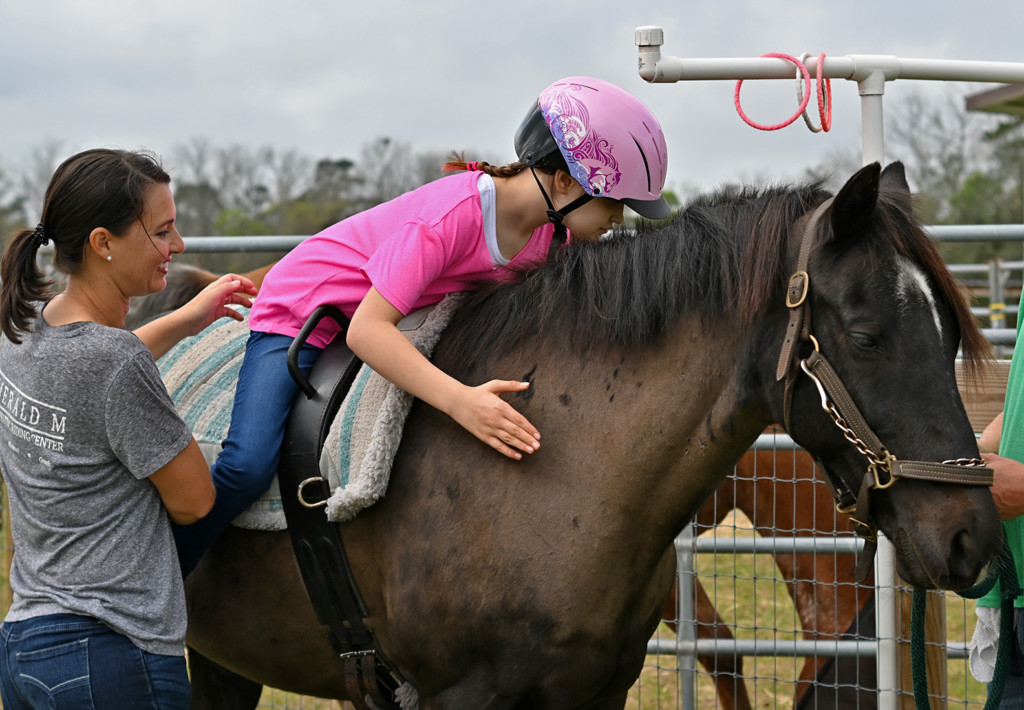
Sarah Clanton, blind and developmentally delayed since birth, gives commands to her horse, Cappy, at the Emerald M. Therapeutic Riding Center as owner and therapist Lisa Michelangelo, left, lends support. Horse therapy, which makes Sarah stronger and improves her sensory skills, is eligible for reimbursement for families using the Family Empowerment Scholarship for students with Unique Abilities.
Emily Hamilton’s two kids learn most things best by doing.
For science, that means making smears on slides, dissecting everything from seeds to mollusks, and conducting chemistry experiments with beakers and flasks. For her daughter’s math, that means using manipulatives such as dominoes, blocks or games.
The costs for those supplies add up quickly for Hamilton, who with her husband homeschools their two children, Wesley, 12, and Holly, 8. Both receive the Family Empowerment Scholarship for students with Unique Abilities, which allows families to personalize their students’ education by directing funds to where they’re needed most.
The funds can be used for a combination of programs and approved expenses including therapists, specialists, curriculum, private school, and more.
“Having unique learners often requires unique approaches to learning, and oftentimes that is through hands-on problem solving, experiential methods that require all of kinds of components to bring to life,” said Hamilton, who pays out of pocket to cover costs that are more than the scholarships are worth. For students with disabilities, scholarships average about $10,000 per student.
This year, new legislation extended the flexibility enjoyed by parents like Hamilton to all the state’s K-12 scholarship programs.
That increased flexibility can be a boon for families who choose to assemble a range of different learning options for their children. But it can also create risks of confusion or costly mistakes. For example, a family might make a purchase they think is reimbursable, only to learn later that it isn’t considered an eligible expense.
To help families make the best possible use of their increased flexibility, and minimize risks and confusion, the new legislation required scholarship funding organizations to create new purchasing guides that would provide clarity to parents on what education-related expenses are eligible expenses for their respective scholarship.
“We wanted to provide clarity,” said Doug Tuthill, president of Step Up For Students, Florida’s largest scholarship funding organization and host of this blog.
“We want to provide as much flexibility as possible for families so they can customize the education of their child but at the same time, we want to protect the public good and make sure the tax dollars are being spent in the most efficient and effective way possible.”
Parent needs, legislative intent and continuous feedback
There are now two purchasing guides. One is for the Family Empowerment Scholarship for Educational Options and Florida Tax Credit Scholarships. These programs are open to all students and include those choosing the new Personalized Education Program. The other guide is for families using the Family Empowerment Scholarship for students with Unique Abilities. The latter program, aimed at students with special needs, offers larger funding amounts and a wider range of eligible uses.
Florida, which has offered ESAs to families of students with unique abilities since that program was created in 2014, has always had rules for how those families could use the money.
“We had nine years of learning to help us develop the new purchasing guides,” said Tuthill. To develop the purchasing guides, the team also examined programs in other states, such as Arizona, which passed ESA legislation in 2011 and offered universal eligibility in 2022.
Step Up For Students also offers an online purchasing platform for families. The goods and services on the platform are offered by approved vendors. Families don’t have to use the online marketplace and can be reimbursed for expenses if they find other items that fit their child’s needs, or identical items available through other vendors for a lower price.
“A lot of our families do and will continue to receive funds through reimbursement,” said Catherine Bridgers, senior director for process improvement and risk management at Step Up For Students and leader of the teams that produced the guides. “We don’t want to put families in the position of interpreting statutes themselves or not having clear guidance in making purchases.”
Tuthill said the guides also help families avoid costly purchases that aren’t allowed and end up being denied.
“We want to minimize disputes between families and their scholarship funding organizations,” he said. However, he added that the guides are “living documents” and will continue to be revised.
Among states with ESA programs, Florida is unique in the way it relies on scholarship funding organizations to determine which uses of scholarship funding are allowed under state law. In other states, government agencies make those determinations
The new law requires scholarship funding organizations to agree on purchasing guidelines that will be shared with the state Department of Education and published by the end of the year. Step Up For Students is coordinating with the state’s other scholarship funding organization, AAA, to produce high-level guidelines. However, eligible expenses may differ based on each organization’s policies. Families should check with their scholarship organizations to determine whether an expense is eligible before they make a purchase. The guides include links on the Step Up For Students website for families using the Educational Options and Unique Abilities scholarships to offer feedback.
“We use that feedback for continuous improvement,” Tuthill said.
Each week, Bridgers and her team meet to examine parent feedback and purchases that fall into gray areas in state law.
A parent recently expressed concern when Step Up asked for more information about a day program for her child, who has Down syndrome. Florida law does not expressly authorize spending scholarship funding on day programs not operated by schools.
However, Bridgers’ team researched the provider and learned that the founder was certified in recreational therapy. That meant the program met the specifications for part-time tutoring under Florida law, which is eligible for scholarship funding.
As a result of that feedback, Step Up For Students now approves reimbursements for full-time day programs that meet state specifications for students 16 and older with intellectual disabilities.
“For this population, these programs are absolutely critical to those students’ development,” Bridgers said.
Can I get it at a district school?
Florida’s scholarship laws outline the types of purchases parents are allowed to make with their accounts. Some, like private school tuition, are straightforward. Other provisions of the law, such as one that allows parents to purchase instructional materials, leave more room for interpretation.
To help determine whether a good or service would be covered by education savings accounts being administered by Step Up, Bridgers and her team asked a key question: Is it offered in a Florida public school?
“We looked at our own statutes, but we also looked at other state statutes and policies and tried to come up with a public-school equivalency test,” Bridgers said. The team also examined statutes governing back-to-school tax holidays to help guide decisions on supplies.
“The spirit of this is that these students on ESAs have the same opportunities as public-school students,” Bridgers said.
That can include sports equipment, such as basketballs. But the guides set limits. The goal is to balance giving families access to a wide range of learning materials (including those a public school might purchase for gym class) while preventing uses of scholarship funds that stray beyond reasonable education-related purchases. Sports equipment can be replaced every two years, according to the guide.
“You couldn’t get 600 basketballs like the public school district could,” Bridgers said. “We really tried to be comprehensive and thoughtful.”
Field trips, including tickets to Florida theme parks, are also included as eligible instructional materials for families whose scholarships are managed by Step Up. However, the guide allows reimbursement of only the scholarship student’s ticket.
“We had a lot of debate about theme parks, Tuthill recalled. “Is a trip to Animal Kingdom at Walt Disney World that educational? Well, it was when I went. We said, okay, if a family wants to go to Animal Kingdom, and it’s a field trip, and they built some learning activities around it, how would you manage it? It’s not unusual for public schools to take field trips to a theme park.”
After all, Tuthill said, “learning can happen in all kinds of situations.”
Bridgers and Tuthill hope the listings in the Step Up purchasing guides will encourage families to get creative when designing their child’s learning plans.
That could include an evening at the Florida Orchestra concert or a community theater production. Research has found that taking students to live theater productions is an effective way to teach academic content, increase tolerance by providing exposure to a more diverse world, and improve students’ abilities to recognize what others are thinking or feeling.
“Our hope is that guardians will sit down with their student learning plans and their students as they look through the guides and they get more ideas to use their funds to create a better experience for their families,” Bridgers said.
For Hamilton and other parents whose customized programs have not relied heavily on co-ops or other offerings of outside groups, the guides have brought much needed clarity, especially to areas that once were considered gray.
“This scholarship was started from a place of true understanding of the intersection of learners with unique abilities and the benefits of alternative schooling opportunities, including homeschooling for their ultimate success,” Hamilton said. “I expect that the end result of all the feedback is a guide that is more robust and clear and can be consistently interpreted by the SUFS processors that review all the reimbursement requests, and continues to allow the unique learners on the scholarship to continue to learn in the way that suits them best and be reimbursed for it.”

U.S. Supreme Court Justice Louis Brandeis coined the notion of American states serving as “laboratories of democracy” in New State Ice Co. v. Liebmann, a 1932 Supreme Court decision.
“A single courageous State may, if its citizens choose, serve as a laboratory; and try novel social and economic experiments without risk to the rest of the country,” Brandeis wrote.
With regards to education freedom, Arizona and Florida have been collaborative laboratories.
Arizona lawmakers created the nation’s first scholarship tax credit program in 1997. This law allows individual taxpayers to donate to a non-profit scholarship granting program and receive a dollar-for-dollar credit against state income taxes for the donation. A few years later, Florida lawmakers created the nation’s largest scholarship tax credit program.
In 1999, Florida lawmakers passed the McKay Scholarship Program, the nation’s first private choice program for students with disabilities. A few years later, Arizona lawmakers attempted to emulate the McKay program. Arizona choice opponents killed this program in the Arizona court system, prompting Arizona choice supporters to develop the nation’s first account-based choice program, the Empowerment Scholarship Account Program. Empowerment Scholarship Accounts withstood a court challenge, and a few years later Florida created what remains the nation’s largest account-based choice program.
Arizona and Florida’s innovators have learned and borrowed from each other. Thousands of unsung heroes from across the country also contributed to the development of this experiment, which remains ongoing. Teams in multiple states will work to optimize the use of accounts in a decentralized learning process. Oklahoma lawmakers have become the first state to adopt a large refundable tax credit for private education. This program likewise bears close examination over time; you never know what the next trend might go.

America has entered a difficult period with Baby Boomers exiting the labor market and a baby-bust diminished cohort of (mostly) their grandchildren entering the education system. Currently the baby bust is approaching the age of 16, so get used to seeing those “Help Wanted” signs. America’s two major political parties seem entirely incapable of reaching a consensus on reforming immigration. Something must give, but it remains unclear what it will be.
All of this is the background soundtrack to America’s public-school system as it grows increasingly dysfunctional and controversial. A complex web of local, state and federal authority attempting to govern a system of local monopolies marked by regulatory capture by unions and major contractors was also an experiment, but not a happy one. Our outcomes do not suggest that our experiment in bureaucracy represents the optimal method for educating students or in recruiting and fulfilling the aspirations of educators.
Our experiment in educational freedom must continue to conclude our experiment in educational frustration. Arizona and Florida have played crucial roles thus far, but new states have entered the collaboration. Young people are the future of any society, and they are getting to be in short supply. Some states are far more eager to give families a better return on their investment than others. America’s ongoing experiment with competitive federalism will soon merge with the experiment in educational freedom.
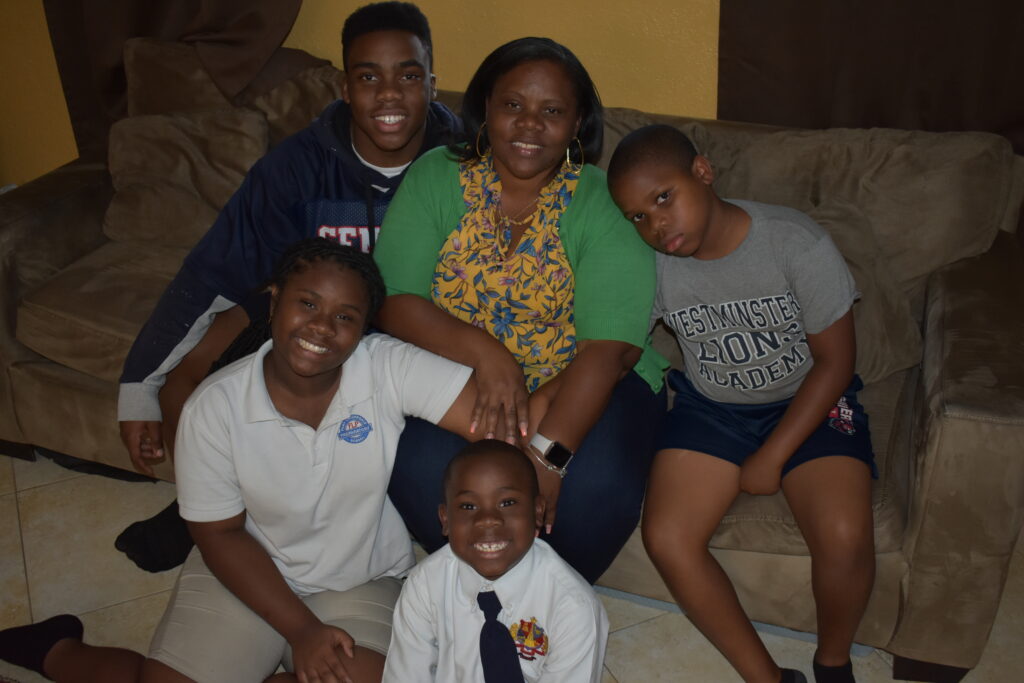
Yanique Dunkley and her children: JR and Mason (on the couch), Maleah and Myles on the floor. Each child receives a Florida Tax Credit Scholarship.
PLANTATION, Florida – There was no way William “JR” Moreland was taking AP Language and Composition as a junior, or so he thought. He heard it was hard, harder than Honors English, which he aced.
“The difference between honors (classes) and AP is completely night and day,” JR said. “You think it’s one step up. No. it’s completely night and day. There was no way I was going to do well in that class.”
But the teachers at Westminster Academy, a private PK-12 school in Fort Lauderdale, can be very persuasive. Despite his pleas to not take the course and, yes, he admitted, some begging, JR was told, “You’re absolutely doing it.”
And he absolutely did.
He aced it.
“That’s my greatest accomplishment in school,” he said.
JR, 17, graduated this spring in the top 10 of his class from Westminster, which he attended since sixth grade on a Florida Tax Credit Scholarship made possible by donations to Step Up For Students. Before that, JR attended Gateway Christian Academy in Fort Lauderdale on the FTC scholarship.
“I do understand that without the scholarship I wouldn’t be where I am,” JR said, “so I don’t take that for granted.”
JR, who lives with his family in Plantation, is headed to the University of Central Florida, where he will major in computer science. After that, he plans to enter the United States Army.
The Army recently resurrected its “Be All You Can Be” slogan. JR said the teachers and administrators at Westminster expect the same from the students.
“Even when you don’t see the potential in yourself, they see the potential in you. It just elevates you to want to do better,” JR said.
To continue reading, go here.
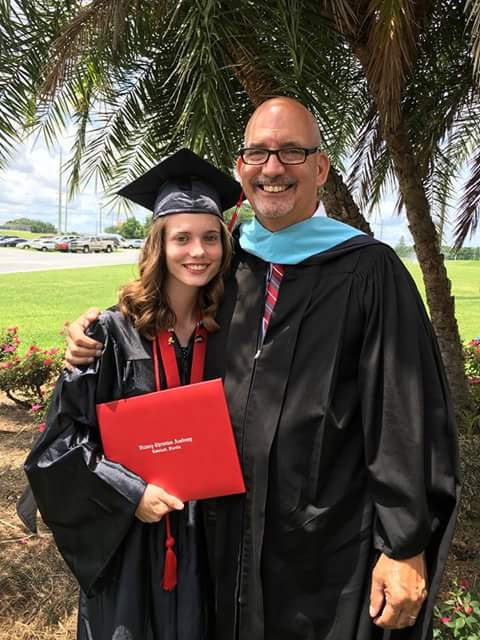
Ashley Elliott of Florida and her principal after her high school graduation. Elliott now serves as coordinator of the Future Leaders Program at the American Federation for Children.
Editor's note: This commentary by Mark LeBlond, policy director of EdChoice, was originally published in the Washington Examiner.
Ashley Elliott was one of the “hard cases.”
Born addicted to drugs and raised by her single grandmother, life was hard for Ashley. She struggled in school — until 10th grade. After years of fighting, bullying, and poor grades, Ashley found refuge in Lakeland, Florida , when a private Christian school admitted her on a tax credit scholarship. There she found teachers who cared about her, who believed in her.
In turn, Ashley began to believe in herself. Ashley thrived, graduating high school, then college, and embarking upon adulthood as an education advocate.
A thousand miles to the north, Pennsylvania policymakers are grappling with a related policy problem. How can the government guarantee a thorough and efficient education to all students, regardless of their background, socio-economic status, or zip code?
In a case dating back to 2014, William Penn School District v. Pennsylvania Department of Education, the plaintiffs argued the state fell short of its constitutional guarantee, and further, that an overhaul of the school funding system is the only solution. After years of wrangling over the role of money in Pennsylvania public education, the courts finally ruled earlier this year.
The Commonwealth Court ruled that Pennsylvania’s present education funding model is broken, yet stopped short of prescribing a fix, instead leaving solutions to the legislature and governor. In her opinion, Judge Renee Jubelirer emphasized that reform does not have “to be entirely financial ... The options for reform are virtually limitless. The only requirement, that imposed by the Constitution, is that every student receives a meaningful opportunity to succeed academically, socially, and civically, which requires that all students have access to a comprehensive, effective, and contemporary system of public education.”
To continue reading, go here.
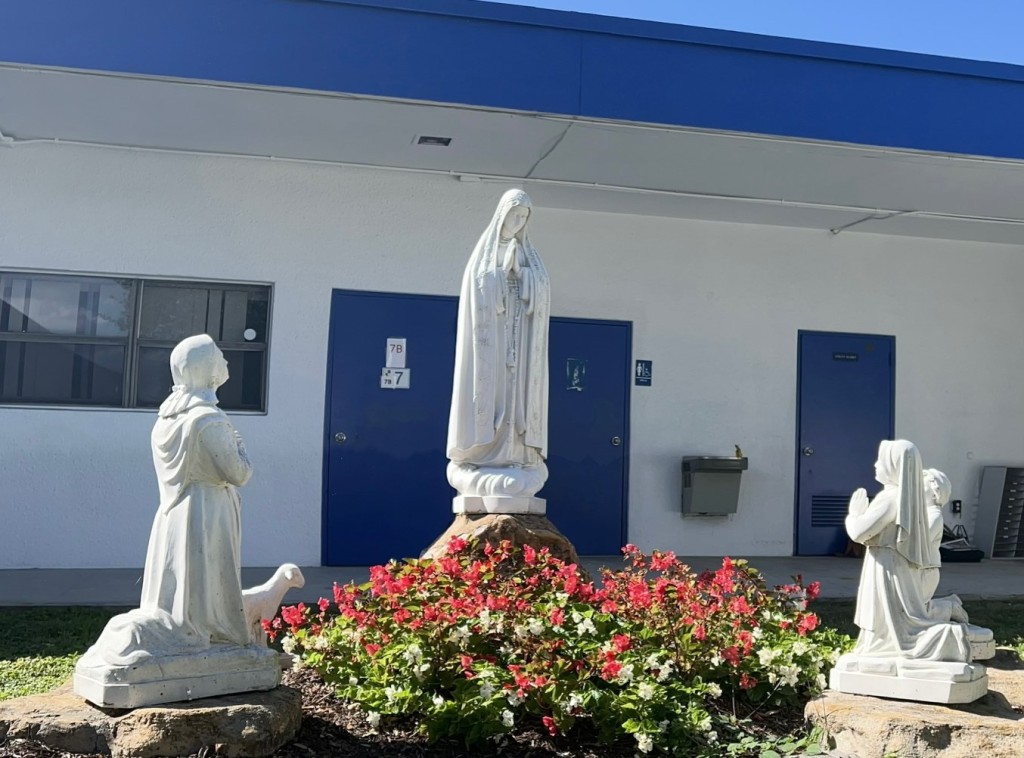
This replica statute of Our Lady of Fatima stands in the courtyard of St. Malachy Catholic School in Tamarac, Florida. Even after the school closed in 2009, the two charter schools that leased the campus never removed it. As the school reopens as a parish school in August, the statue has inspired those working to prepare the school for reopening. Photo courtesy of the Archdiocese of Miami
Since it closed in 2009, a victim of the Great Recession that wrecked family finances across the United States, the campus on the grounds of St. Malachy Catholic Church in Tamarac, Florida, has housed secular charter schools.
However, despite the focus those learning institutions placed solely on academics, one sacred element remained: the statue of the Virgin Mary. She stands in a courtyard atop a stone pedestal, in front of three children who kneel in reverence. The statue is a replica of Our Lady of Fatima, which, according to the Catholic church, the Virgin Mary appeared six times to three Portuguese shepherd children starting in 1917 and shared visions and messages. The church declared the visions of Fatima as “worthy of belief” in 1930.
As St. Malachy Catholic Church prepares to reopen its parish school after a 14-year hiatus, the statue is a powerful symbol of what a community’s faith and teamwork can accomplish.
“They never removed the statue of Our Lady,” said Zoraida Perez, the school’s registrar and first employee hired for the reopening. She said the fact that the statue remained feels like a miracle to her. “I did work in another parish where a charter school took over, and the first thing they did was remove all the images.”
Perez, who was not working for St. Malachy in 2008 but who lived in the area, recalled the strong emotions people felt when the economy forced the school, along with seven other area Catholic schools, to close due to low enrollment.
“Many of those families were so sad, and they had to decide between providing a home and food for their children or a private, parochial education,” said Perez, whose three children attended Catholic schools. Many of them had to make the decision to school and go to public school.”
Those who were able to continue in Catholic schools were offered seats at other area schools.
The transition to new schools was tough for some families, who missed the sense of community that a smaller school like St. Malachy, which first opened in 1984, provided. The school and the church are named for St. Malachy, an Irish Saint who lived during the 1100s.
The church leased the campus to a charter school, which closed in 2018. Another followed but closed in 2021 amid the coronavirus pandemic.
When leaders announced in March that the parish would reopen the school, a woman whose two children had to transfer to another Catholic school when St. Malachy closed showed up immediately with donations of backpacks and school supplies.
“She said her kids felt lonely because they were the new people at the school,” Perez said. “She said what they had at Saint Malachy was a family.”
Parish and school leaders said they based the decision to reopen on a population boom that included many young families moving to the area. Tamarac boasted a population of nearly 72,000 in 2020, according to the latest U.S. Census figures. That’s an increase of more than 10,000 from 2010, when the census showed a population of 60,427.
“The decision to reopen St. Malachy followed a feasibility study in which we looked at local demographic trends, educational options and other factors. Through this study, we determined that a viable Catholic school could reopen at St. Malachy without operating to the detriment of nearby Catholic schools,” said Jim Rigg, superintendent of schools for the Archdiocese of Miami.
Rigg, who as superintendent oversees 63 Catholic schools, doesn’t need statistics to show him what he has observed.
“People are moving here from all over the world, from the United States and Latin America and the Caribbean,” Rigg said. “We’re in growth mode.”
Figures from the 20222-23 school year confirm Rigg’s statement.
Total enrollment came in at 33,577, the highest in more than five years.
In Key West, the Basilica School of St. Mary Star of the Sea is expanding to offer high school in August. It will be the first time since 1986, when Mary Immaculate High School closed, that the county has had a Catholic high school. Also, Cristo Rey Miami High School, an independent Catholic school, opened in 2022.
Across the Sunshine State, Catholic school enrollment rose 6.3 percent in 2021-22, the biggest jump of any of the 10 states with the biggest Catholic enrollments and outpacing the 3.8 percent hike nationally, according to state-by-state figures from the National Catholic Educational Association.
Leaders attribute Florida’s trend-defying figures over the past several years to its robust education choice laws, which offer families access to scholarships to attend private schools.
“Catholic schools in states that have school-choice programs…had greater enrollment stability over the past two years than Catholic schools in states with no private-school choice,” according to a study by the Manhattan Institute. “That is, Catholic schools in states with multiple choice programs (two or more) lost far fewer students in the first year of the pandemic (–4.9%) than states with no private-school-choice programs (–7.6%), but both the robust choice and the nonchoice states rebounded in 2021–22 by the same percentage (+4%).
The six states with education savings accounts, which give families the ability to use funds to customize their students’ education, also saw enrollment increases that were twice as large as states that had no ESAs. This year, the Florida Legislature expanded education choice by granting automatic eligibility to all students regardless of income.
Even so, Archdiocese of Miami leaders are starting small at St. Malachy, with seats only for 4-year-old kindergarten and voluntary pre-kindergarten students as well as kindergarten. They expect to have about 45 students the first year. The next year, they plan to begin adding other grades, eventually capping out at eighth grade. (To learn about registration and careers, go here.)
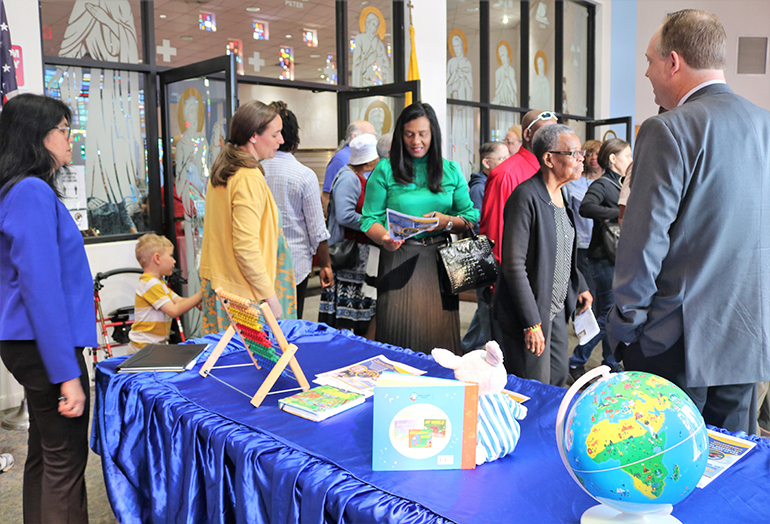
Jim Rigg, superintendent of schools for the Archdiocese of Miami, answers questions and hands out information about the soon-to-reopen St. Malachy School after church services at St. Malachy Church. Photo by Linda Reeves of Archdiocese of Miami
Perez said the community response has been overwhelming since word got out about the reopening plans. The Knights of Columbus St. Malachy Council 13355 have been doing handywork to help get the school ready to open in August. Nearby St. Bonaventure School reached out with guidance and local companies have donated and installed technology as well as offered free uniforms in the school’s blue and gold colors for incoming students.
In the areas of the school that will be occupied this fall, community members have installed new flooring, provided new furniture, moved the administrative offices to the front of the building and built a new canopy for the playground to provide shade. A parliament of owls found living in one part of the building provided inspiration for the school mascot: the owl.
“It takes a village to raise a child,” Perez said, quoting the African proverb. “This is where you find it.”
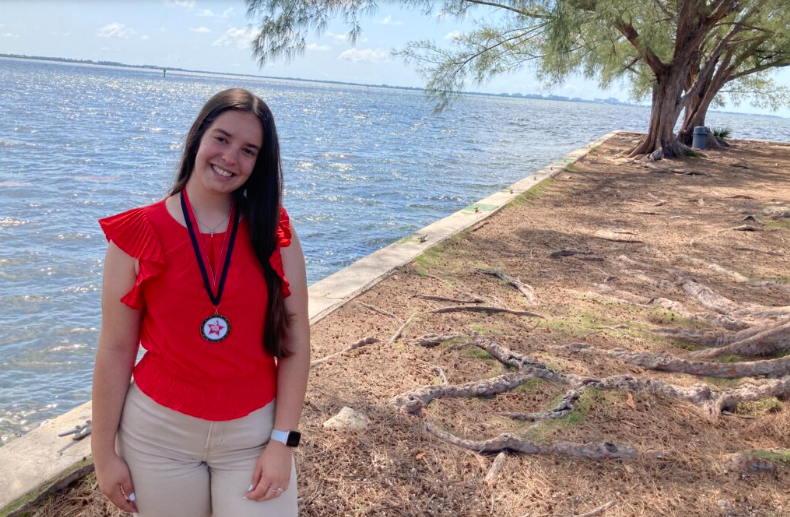
Among Ilen Perez-Valdez’ many accolades: National Honor Society member, Immaculate-LaSalle’s Spanish Honors Society president, Science Honors Society vice president, and English Honors Society treasurer.
MIAMI – Nery Perez-Valdes wanted to become a doctor, but life got in the way.
She fled Cuba for Miami with her mom when she was 11 and found herself working at 14 to help pay the bills. Nery would become a single mom and for a long stretch worked two jobs to keep the lights on and food on the table.
Nery always wanted a private school education for her daughter, Ilen, and a Florida Tax Credit Scholarship made possible by corporate donations to Step Up For Students allowed that to happen.
“I was a single mom since I was three months pregnant, and when I’m saying, ‘single mom,’ I’m telling you ‘single mom.’ No child support. No help. No nothing. Period. The end,” Nery said. “Thanks to Step Up For Students, Ilen was able to get the education I wanted for her.”
Ilen has made the most of that opportunity – and then some.
She graduated this spring near the top of her class at Immaculate-LaSalle High School, a prestigious Catholic school in Miami. She has a scholarship to the University of Miami and plans to major in neuroscience and double minor in business administration management and Spanish. Her goal is to attend medical school and become a pediatric oncologist.
“My mother never received a college education. She was barely able to graduate high school. All she has done since she got (to the United States) is work, work, work,” Ilen said. “She came here looking for the American dream. I feel like if I succeed, she can live out her American dream through me.”
Ilen has received a Florida Tax Credit Scholarship since kindergarten. She said she’s grateful for the opportunity to receive a quality education – first at Saint Agatha Catholic School, and then at Immaculata-LaSalle.
“It was really difficult to make ends meet when I was younger, so I wouldn’t have been able to attend a private school where I received such an excellent education,” she said.
To continue reading, click here.
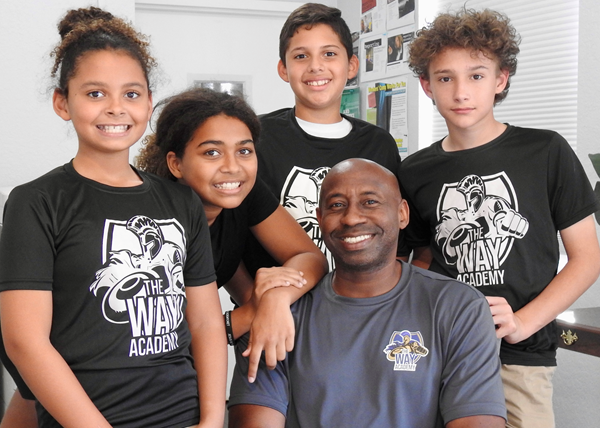
Charles Williams, founder of The Way Academy, surrounded by his daughters, Emma Williams and Elyn Williams, and students Christiaan Ruiz and Ezra Bartoli.
MINNEOLA, Fla. — The way Charles Williams sees it, if the human vessel comes to the conversation with humility, faith and willingness, the Almighty can communicate a message of divine purpose without resorting to special effects.
Sometimes — because God often whispers, Williams notes — all that is required is some contemplative quiet, especially if it can be managed during a season in which miracles are acknowledged and anticipated.
So it was, five winters ago, having listened carefully in the silent space between the hurly burly of Christmas events, an idea manifested itself. Too unpresuming to imagine he’d conjured it on his own, Williams is certain beyond debate divine intervention was afoot.
He brought the news to the extended family’s Christmas table and broke it gently, as you sometimes do when you’re about to ask your family to act boldly on God’s will. “What if we started a school?” he said. “How would it be?”
There are plenty of teachers in the Williams family, wife Betsy among them. As she recalls, “We all laughed. ‘We can’t start a school! How do you even do that?”
Now they know.
As the freshly minted principal of Real Life Christian Academy in nearby Clermont (after 17 years working up the public school ladder), he found himself in the right place to grasp the operations of a Christian school.
Also, he studied. It turns out there’s plenty of how-to information about school startups. The Florida Department of Education even has a webpage entitled Opening a Private School. Eventually, Williams found his way to the Drexel Fund, a Seattle-based nonprofit venture philanthropy that (from its website) “seeds new school models, scales networks of existing schools with a track record of academic and operational excellence, and strengthens the educational ecosystems needed to create the market conditions necessary for new private schools serving low-income students to thrive.”
When Drexel came on board, solving the puzzle of startup financing, things began to happen fast. Now, here we are, at an open house on an April Monday, and Williams is expounding on His vision — the capitalization intentional.
“The math, the science, the [English language arts], history … all will be coming from the Bible and being taught by Christian teachers and Christian leaders.”
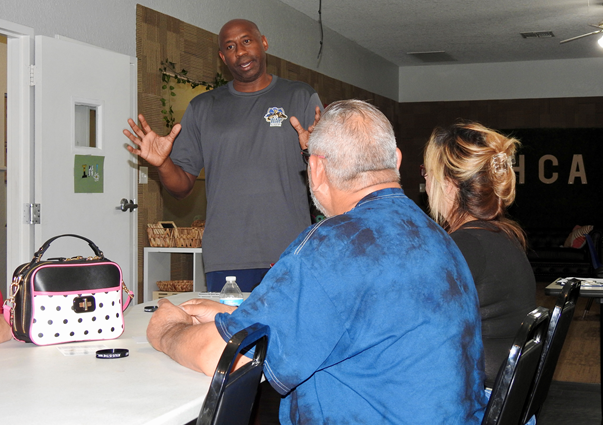
Williams, pictured here with parents Rigaberto Valle and Linette Bolanos, forges close relationships with The Way families.
Come August in Minneola, a small town northwest of Disney World, the vision planted in Williams’ obedient head is scheduled to become manifest when The Way Academy reopens the doors of the former New Hope Christian Academy.
The location, near the highlands of the Lake Wales Ridge, is appropriate. Williams and his board members mean to reach for heights of biblical proportions.
One would expect nothing less from a school designed to live out John 14:6, in which Jesus tells the disciples, “I am the way and the truth and the life. No one comes to the Father but through me.”
“Everywhere we turned, John 14:6 kept coming back,” Williams says. “We go to church and the preacher’s preaching on it. And we say, ‘This is it. The Way Academy. Showing kids, showing parents, showing the community, showing teachers, The Way. … And we’re going to be warriors about it. That’s who we are, the Warriors.”
Appropriately, Williams shares his name with the British poet, novelist, theologian and Inkling, a member of the Oxford Christian literary society that included C.S. Lewis (Chronicles of Narnia) and J.R.R. Tolkien (The Lord of the Rings). Appropriate because, like the Williams of Lake County, England’s Charles Williams was an out-of-the-box risk-taker.
The founder and first TWA headmaster, Williams didn’t need a new job. The Orange County School District had recruited him out of Real Life Academy to become its dean of students for the Orange County School District, meaning his professional future and, not insignificantly, retirement pension, were utterly tidy.
Now, brandishing a rich and varied academic background — from band director to teacher to coach to principal — to the task at hand, he’s left the secure nest and climbed out on that proverbial limb.
Parents who came to know him during two years he served in the administration of nearby Real Life Christian Academy are eager to join him on the bough.
“We called him ‘The Ghost,’” says Rosa Albalate, whose son Christian Ruiz, 11, is a prospective TWA student. “You could never find him in his office. He was always out with the kids. On the playground, in the cafeteria, in the hallways, in the classrooms. And the students loved it.”
Williams means to infuse the new school with a similar peripatetic spirit. A typical TWA day will include the usual middle-school shuffling among classrooms for various subjects, but also morning stretching and afternoons devoted to interscholastic sports.
And they’ll travel around Minneola’s cozy confines to use athletic and other extracurricular facilities offered up by the city, the YMCA, and a charter school.
Not that anyone involved doubts the difficulty of climbing their personal Mt. Ararat.
“Nobody wants to be in middle school these days,” Betsy Williams says. “Nobody wants to teach there, nobody wants to head it up. It’s hard to be a middle school parent. We know that middle schoolers go through a lot, even in general, now adding what they're going through” — here she punctuates with air quotes — “these days.”
“So, we're excited to be a school that commits to those kids.”
The excitement isn’t just infectious. It’s kinetic. Parents at the open house positively vibrated with enthusiasm.
“We’re looking for something a little smaller,” says Linette Bolanos, whose 11-year-old son, Aleksei, is set to transfer from Real Life Christian and its nearly 500-student K-12 campus. “Something family oriented that’s focused on Jesus.”
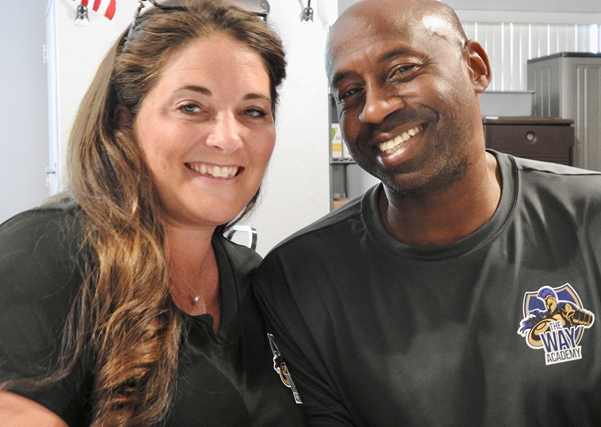
Williams and his wife, Betsy, who serves as the school’s admissions officer.
TWA ticks every box. TWA plans to limit first-year enrollment to 65 students across three middle-school grades. Parents and siblings will be invited to participate in a variety of TWA activities. And the Bible-based curriculum, stressing critical thinking and practical learning, comes straight from Bob Jones University Press — the same BJU that counts evangelist Billy Graham and former Arkansas Gov. Asa Hutchinson among its alumni.
“We’re interested in a school that has a background in faith, a school that provides spiritual guidance,” Albalate says. “Dr. Charles promised he will keep on it.”
Williams is big on standing by vows, including the one, shared with the Drexel Fund, about making the school affordable for low-income families. Excitement attends Florida’s massive expansion of school-choice opportunities through legislation signed by Gov. Ron DeSantis March 27. Moreover, through its close alignment with Step Up for Students, the school is acting to bridge the gap for families who may need a boost beyond the state’s per-student stipend.
That worry largely settled, TWA organizers can concentrate on what they’ve taken on.
Asked to enumerate TWA’s biggest challenges, Betsy Williams pulls a face. Several seconds pass. More air quotes. “These days,” she repeats. She’d rather talk about TWA’s opportunities, which come rapid-fire.
“To spread the Gospel is the biggest opportunity we have, and that’s what we’re called to do,” she says. “The next is to inspire kids in a way of healthy choices and getting moving in a world where all they want to do is look at a screen.
“The third opportunity is … to be a light in the community. We’re excited about all that.”
This is The Way, then. The Warrior way.

Nevada Sen. Heidi Seevers Gansert introduced SB 220, which would have expanded the state’s Opportunity Scholarship program and increased eligibility for 400% of the federal poverty line, children with disabilities and children o first responders.
This commentary from Valeria Gurr, a senior fellow for the American Federation for Children and a reimaginED guest blogger, appeared last week on thenevadaindependent.com.
During his State of the State address, Nevada Gov. Joe Lombardo pledged to increase funding and eligibility for Opportunity Scholarships, expand charter schools, create the Office of School Choice, and increase funding for public schools at a record number.
Legislators such as Sen. Heidi Seevers Gansert went to work introducing SB220, which would expand the Opportunity Scholarship program to serve approximately 6,000 students who cannot afford another educational option to attend schools of their choice if their current assigned public school is not working for them.
SB220 would also increase eligibility for 400% of the federal poverty line, children with disabilities and children of first responders. However, because Democrats in Nevada have control of both chambers and are vehemently against educational choice, SB220 was never set to get a hearing.
As a matter of fact, Democrats in the Silver State have continuously denied the Opportunity Scholarships a hearing and use education as a political pawn incessantly pointing at school choice as a way to defund public education — a talking point that could not be further from the truth.
Giving families 5% of options won’t defund public schools. Instead, it will bring opportunities to those who need them.
Enter Lombardo, a leader not afraid to go against the grain and willing to expend political capital for the children instead of accepting the status quo.
To continue reading, click here.
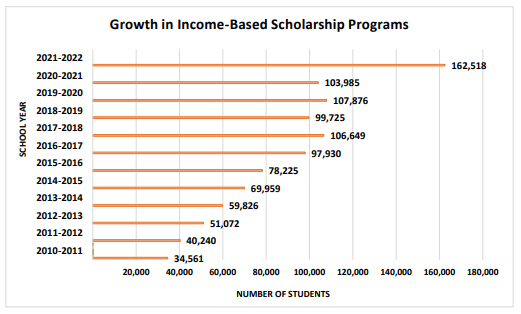 The number of Florida students participating in income-based scholarship programs served by Step Up For Students over the past 12 years has grown dramatically, from 34,561 in 2010-11, to 162,518 in 2021-22, according to a new report by Step Up For Students, the nonprofit scholarship funding organization that helps administer the scholarships and which hosts this blog.
The number of Florida students participating in income-based scholarship programs served by Step Up For Students over the past 12 years has grown dramatically, from 34,561 in 2010-11, to 162,518 in 2021-22, according to a new report by Step Up For Students, the nonprofit scholarship funding organization that helps administer the scholarships and which hosts this blog.
The largest increase in Step Up students occurred between 2020-21 and 2021-22, however this was due to Step Up taking over stewardship of enrollment numbers of the Family Empowerment Scholarship for Education Options (FES-EO), a program that had previously been administered by the Florida Department of Education. Statewide enrollment for income-based scholarships increased from 142,716 to 162,518 when all sources of enrollment are included.
In the most recent year, a total of $1,715,159,524 was awarded to families from Step Up.
The annual end-of-year report looked at characteristics of private schools and enrolled students who received a Florida Tax Credit Scholarship or a Family Empowerment Scholarship for Educational Options through Step Up For Students, examining the distribution of private schools by various attributes and calculating graduation rates for 12th grade scholarship students enrolled in these schools.
Additionally, the report analyzed student demographics both in overall program enrollment and graduation rates.
Among the findings:
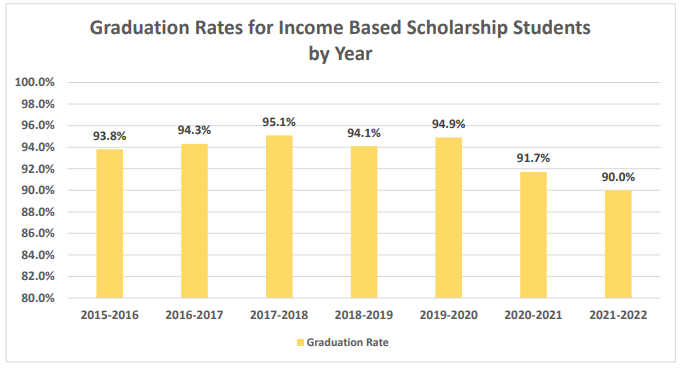
The graduation portion of the report was modeled after the National Center for Education Statistics’ biennial report, “Characteristics of Private Schools in the United States: Results from the 2019-2020 Private School Universe Survey.”
Data from the Florida Department of Education were utilized to examine these private schools along with data collected by Step Up For Students through school surveys. Data on religious affiliation were collected at the school level. Information about students’ gender, race/ethnicity, grade, single parent household status, poverty level, and graduation status were collected at the student level.
The survey received a 92.4% response rate.
*Edited to clarify that part of the growth in scholarships awarded by Step Up For Students was due to administrative changes in the FES-EO scholarship.
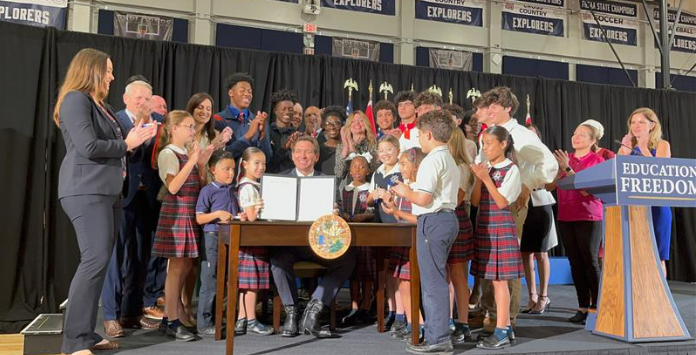
On this episode, reimaginED senior writer Lisa Buie talks with Doug Tuthill and Amy Graham of Step Up For Students, the nation’s largest K-12 education choice scholarship funding organization. Tuthill is president of Step Up, and Graham is vice president of policy, innovation and empowerment for the Florida-based organization. Step Up For Students administers most of the education choice scholarships in Florida and hosts this blog.
“The fantastic thing about (education savings accounts) is they're very flexible, and we're all about customization. And this whole ed choice movement is about giving families more flexibility to be able to customize an education for their child. And I think the ESA piece, as well as universal eligibility, are really game changers.” – Doug Tuthill, president, Step Up For Students
Tuthill offers an overview of the 40-year history of education choice in the Sunshine State and how district magnet schools gave rise to more options such as charter schools, virtual schools and scholarship programs that allowed parents to decide the best learning environment for their children. Tuthill also discusses the details of the newly signed law HB 1 and how the conversion of traditional scholarship to education savings accounts will give families even greater flexibility in customizing their children’s education. He also clears up misinformation about the expanded program regarding eligibility, costs and equal opportunity. Tuthill also talks about how HB 1 will open up opportunities for educators to start their own innovative programs, further expanding options for students.
Graham discusses regulatory accountability and guardrails built into the bill as well as a new personalized education plan classification for homeschool families who choose to use state funds to completely customize their child’s education. (The law exempts homeschool families who do not wish to accept state funds from certain accountability rules that apply to those in the personalized education program.)
Graham offers details on the new purchasing guide under development that will list pre-approved goods and services to make it easier for families to manage their funds. She also discusses how HB 1 will simplify the evaluation process for non-public school students to qualify for funding through the state’s education savings account program for students with unique abilities. That program also received expanded funding through HB 1 to eliminate a wait list.
Graham also outlines how HB 1 is intended to aid school districts by providing relief from some of their most burdensome regulations so district schools can be competitive options.
EPISODE DETAILS:
RELEVANT LINKS:
https://www.fldoe.org/schools/school-choice/k-12-scholarship-programs/fes/
https://www.stepupforstudents.org/